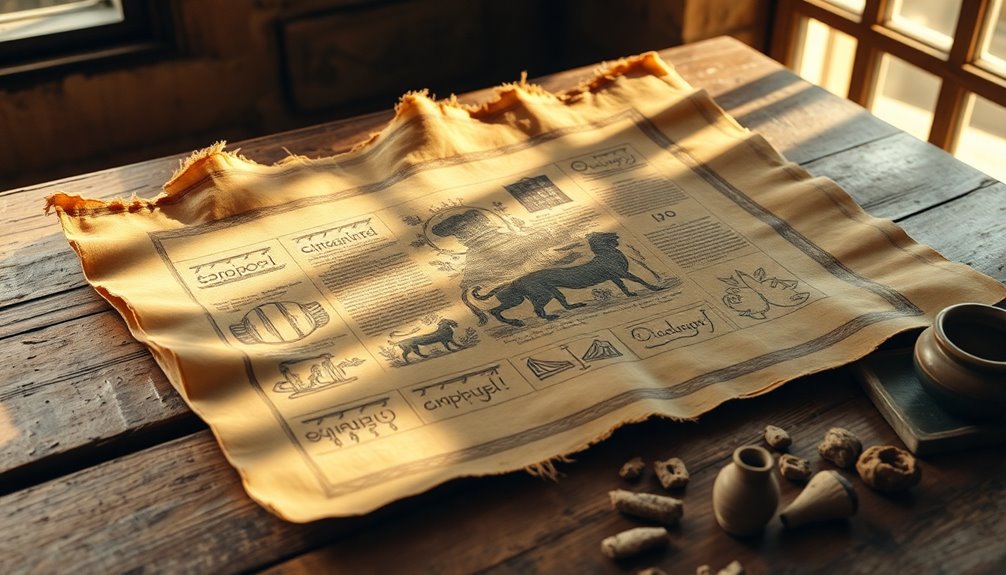In the Bible, the Canaanites are significant figures mentioned over 150 times, primarily as the original inhabitants of the land promised to Abraham's descendants. You'll find them confronting the Israelites during their conquest, and they're depicted as formidable adversaries with fortified cities. Their polytheistic beliefs and rich trade networks significantly influenced early Israelite culture and ethics. While often portrayed negatively in biblical texts, archaeological evidence reveals a more complex society, comprising various tribes like the Hivites and Amorites. If you explore further, you'll uncover fascinating details about their enduring legacy and cultural impact on modern societies.
Key Takeaways
- Canaanites were the original inhabitants of Canaan, opposing Israel during their conquest as described in the Bible.
- The Bible mentions Canaanites over 150 times, highlighting their significance in the narratives of Genesis and Exodus.
- Canaanites practiced polytheism, worshipping deities like Baal and Asherah, influencing Israelite religious practices.
- Archaeological evidence reveals Canaanite cultural diversity, contradicting their portrayal as a homogeneous group in biblical texts.
- Modern populations in Lebanon show genetic continuity with ancient Canaanites, reflecting their lasting legacy in the region.
Introduction

The Canaanites, as described in the Bible, were the original inhabitants of Canaan, a land that God promised to Abraham and his descendants. This land, often referred to as the Promised Land, was home to various tribes, including the Hivites, Jebusites, and Amorites.
You'll find that throughout the biblical narrative, these Canaanites are portrayed as significant adversaries to the tribes of Israel during their conquest of the territory.
Moses sent spies to scout Canaan, and their reports of fortified cities and giants known as the Anakim instilled fear among the Israelites. The subsequent conquest, led by Joshua, involved notable victories, such as the fall of Jericho, which many attribute to divine intervention.
However, even after initial successes, remnants of Canaanite culture persisted, complicating the Israelites' settlement efforts.
The ongoing conflicts during the period of the Judges demonstrate the Canaanites' lasting influence. As you explore the biblical account, you'll see how the struggles between the Canaanites and the tribes of Israel shaped the early history of the Israelites in their quest for the Promised Land.
Canaanite Biblical References

When you look at the Bible, you'll find over 150 mentions of the Canaanites, primarily highlighting their role as the land's original inhabitants.
These references illustrate their complex character, both as formidable opponents and as a people whose influence shaped Israelite culture.
Let's explore these primary and secondary references to better understand their significance in biblical narratives.
Primary Bible References
Throughout the Bible, Canaanites pop up over 150 times, often portrayed as the main adversaries of the Israelites during their journey to claim the Promised Land. The land of Canaan is described as a bountiful area promised to Abraham's descendants, which plays a crucial role in the narratives of Genesis and Exodus. For instance, in Genesis 12:7, God confirms this promise, while Exodus 23:27-31 outlines the boundaries of the land.
When Moses sends spies to explore Canaan, they report its richness but also note the presence of fierce giants, which instills fear among the Israelites, delaying their entry into the land (Numbers 13). Eventually, under Joshua's leadership, the Israelites begin their conquest, starting with the miraculous fall of Jericho, attributed to divine intervention (Joshua 6).
However, the relationship between the Canaanites and the Israelites remains complex even after the conquests. The Book of Judges highlights the ongoing presence of Canaanites in Israelite territory, illustrating the struggles faced by the Israelites in fully claiming the Promised Land (Judges 1:27-36).
This ongoing conflict shapes much of the biblical narrative.
Secondary Bible References
Exploring secondary biblical references reveals a broader context for understanding the Canaanites beyond their role as adversaries. You'll find that the Canaanites are mentioned over 150 times in the Old Testament, often depicted as fierce opponents of the Israelites. These references help illustrate the complex dynamics of the land of Canaan during Israel's conquest.
Biblical texts frequently characterize the Canaanites as wicked and idolatrous, engaging in worship practices that starkly conflict with Israelite beliefs. For instance, Deuteronomy 7:1-5 emphasizes the need to resist these practices.
The Israelites' initial exploration of Canaan, involving spies assessing its bounty and formidable inhabitants, highlights the challenges they faced (Numbers 13).
Even with key victories, like the fall of Jericho, attributed to divine intervention (Joshua 6), the presence of Canaanites remained a significant challenge. Strongholds persisted, leading to ongoing conflicts during the time of the Judges (Judges 1:27-36).
These secondary references deepen your understanding of the Canaanites, shedding light on their role in Israel's narrative as more than mere adversaries but as a critical part of the story within the land of Canaan.
Canaanite Trade Networks Established

Canaanite trade networks thrived during the Late Bronze Age, connecting bustling urban centers like Ugarit, Tyre, and Sidon with neighboring regions. These networks facilitated the exchange of goods such as textiles, metals, and luxury items, which played a crucial role in the economy of Canaanite city-states. One of the most significant commodities was the production of purple dye from mollusks, a luxury item that enhanced the economic status of Canaan in the Mediterranean market.
The Canaanites utilized a complex system of trade routes, incorporating both overland paths and maritime shipping. This approach allowed for efficient distribution of goods across the eastern Mediterranean and even into Mesopotamia.
Evidence from the Amarna Letters reveals that Canaanite leaders engaged in diplomatic correspondence and trade agreements with major powers like Egypt and the Hittites, underscoring Canaan's strategic importance in regional trade dynamics.
Archaeological findings, including clay tablets and inscriptions, demonstrate that Canaanites participated in long-distance trade. These activities contributed significantly to the cultural and economic exchanges that shaped ancient Near Eastern societies, marking the Canaanites as key players in the era's trade networks.
Canaanite Religious Practices

Religiously, the Canaanites frequently embraced a polytheistic tradition, worshipping a diverse pantheon of deities like Baal, Asherah, and El. Each god represented different aspects of life, such as fertility, storms, and agriculture, forming the core of Canaanite religion.
Ritual practices were central to their beliefs, including temple worship, offerings, and sacrifices. They often used animals and agricultural products to appease the gods, ensuring prosperity and fertility.
Fertility rites held particular significance, especially those dedicated to Baal. These rituals often involved sacred sexual practices, believed to enhance agricultural yields.
Canaanite religious ceremonies incorporated sacred symbols, cultic objects, and altars, creating a vibrant spiritual landscape. Divination practices were also common, as worshippers sought guidance from their deities.
The influence of Canaanite religious beliefs extended beyond their borders, significantly impacting neighboring cultures, particularly the Israelites. This led to tensions and conflicts, as seen in biblical narratives condemning idolatry.
Canaanite religious practices illustrate a complex system of belief that shaped their society, reflecting their deep connection to nature and the divine.
Canaanite Identity in Scripture

When you explore Canaanite identity in scripture, you'll notice how cultural stereotypes often overshadow their historical reality.
The Bible paints a picture of the Canaanites as uniformly wicked, but this generalization raises questions about historical accuracy.
Debunk Canaanite Cultural Stereotypes
Throughout biblical history, the Canaanites have often been unfairly portrayed as a monolithic group defined solely by their idolatrous practices and moral failings. This stereotype overlooks the reality that the Canaanites were a collection of diverse tribes, including the Hivites, Jebusites, and Amorites, each with unique cultural traditions and identities. Rather than seeing them as a single adversarial entity, it's crucial to recognize the complexity of Canaanite society.
Archaeological evidence reveals that Canaanites established rich urban centers and engaged in trade and agriculture, contributing significantly to the region's cultural and economic landscape. They developed advanced technologies and influenced neighboring cultures, including the Israelites, in ways that have often been ignored. The biblical portrayal primarily emphasizes their perceived wickedness, serving to justify the Israelite conquest, which further entrenches these stereotypes.
Moreover, modern genetic studies indicate a continuity between ancient Canaanites and contemporary Lebanese populations, suggesting that Canaanite identity persisted over millennia. By challenging
Historical Accuracy Concerns
Understanding Canaanite identity in biblical scripture requires examining the historical context and accuracy of these accounts. The biblical portrayal often depicts Canaanites as a homogeneous group, but archaeological evidence reveals a tapestry of tribes and city-states, each with unique identities. Scholars like Lemche argue that the term "Canaanite" lacks a precise ethnic definition, including various groups such as Hittites, Amorites, and Jebusites. This ambiguity leads to debates about their representation in biblical texts.
The Amarna Letters shed light on the intricate political dynamics of the time, showing local rulers engaged with greater powers like Egypt. This complexity contrasts sharply with the biblical narrative, which often emphasizes Canaanite opposition to Israel.
Further archaeological findings indicate that Canaanite culture didn't vanish after Israelite conquests, as the biblical accounts suggest. Instead, it evolved and persisted in the region.
Modern genetic studies also reveal a continuity between ancient Canaanites and today's Lebanese populations. This evidence challenges the biblical depiction of total destruction, suggesting that the Canaanite identity survived through generations, calling into question the historical accuracy of these ancient texts.
Canaanite Influence on Modern Ethics

When you look at Canaanite values, you might notice their emphasis on community and shared rituals, which still resonate in modern ethical practices.
Their approach to daily life and community service illustrates how ancient beliefs can shape contemporary moral frameworks.
Canaanite Values in Daily Life
Canaanite values played a significant role in shaping daily life, and their influence can still be seen in modern ethical discussions. Their polytheistic belief system, centered around deities like Baal and Asherah, established ethical norms that guided daily actions and community interactions.
The Canaanites placed immense value on land, viewing it not just as a resource but as a sacred trust that required stewardship. This respect for land fostered a communal approach to ethics, where the well-being of the community took precedence over individual desires.
The Canaanites' agricultural practices and trade networks further enriched their ethical framework, promoting values like loyalty and social responsibility. Their legal codes, which governed property and trade, laid the groundwork for later legal systems, echoing principles of fairness and justice.
Additionally, their focus on family and kinship emphasized the importance of relationships, reinforcing a sense of belonging and mutual support.
In today's world, these Canaanite values resonate in our discussions about community responsibility and sustainable practices. You can see how these ancient ethical norms continue to shape the way we think about our relationships with each other and the land we inhabit.
Canaanite Values in Community Service
Community service in ancient Canaan was deeply rooted in the values of hospitality and generosity, which shaped societal interactions and reinforced bonds among individuals. The Canaanites understood that their community's strength relied on cooperation and shared responsibilities, especially in agricultural and trade practices.
Their rituals often emphasized these communal values, fostering a culture of mutual aid. Archaeological evidence shows that Canaanite city-states operated on principles that emphasized support for one another, influencing neighboring cultures, including the Israelites.
This blend of values led to the development of ethical frameworks that prioritized social responsibility. Canaanite storytelling, often woven into biblical narratives, conveyed moral lessons about community solidarity, teaching the importance of helping one another.
As you explore modern discussions of community service, you'll find that many of these ancient principles persist today. The Canaanites' emphasis on generosity and cooperation continues to inform contemporary ethical standards.
Canaanites' Lasting Cultural Impact

The lasting cultural impact of the Canaanites is evident in various aspects of ancient and modern life in the region. Their polytheistic religious practices and diverse deities significantly shaped ancient Israelite religion, leading to the syncretism that you see in the Hebrew Bible.
Canaanite advancements in agriculture, trade, and urbanization provided foundational elements for the development of Israelite societal structures, influencing how communities were organized and sustained.
Archaeological findings show that Canaanite linguistic and artistic traditions persisted even after the Israelite conquest, highlighting a remarkable cultural continuity. This is reflected in the material culture that thrived during and after their time, with Canaanite craftsmanship in pottery and textiles becoming integrated into daily Israelite life and economy.
In addition, many place names in modern Israel and Lebanon still retain their Canaanite origins, illustrating the enduring legacy of this ancient civilization.
You can see how the Canaanites' contributions have woven into the fabric of regional identity, creating a rich historical tapestry that continues to influence life today.
Additional Resources

Exploring the rich history of the Canaanites can be greatly enhanced by diving into a variety of additional resources. Start by examining the biblical texts, particularly the Book of Genesis, which outlines God's promise of Canaan to Abraham and his descendants. This foundational narrative sets the stage for understanding the land's significance to the twelve tribes of Israel.
Next, delve into the Book of Joshua, where you'll find detailed accounts of the Israelite conquest of Canaan. Key events, such as the fall of Jericho, illustrate the conflicts between the Israelites and the Canaanites, revealing the divine interventions that shaped their stories.
For a broader perspective, explore modern archaeological findings that shed light on Canaanite culture, religious practices, and their interactions with neighboring societies. Genetic studies also offer insights into how Canaanites influenced early Hebrew identity.
Lastly, look into commentaries and scholarly articles that analyze the negative portrayals of Canaanites in the Bible, particularly regarding polytheism and idol worship. These resources will enrich your understanding of the complex dynamics between the Canaanites and the Israelites throughout history.
Frequently Asked Questions
Who Are Canaanites in the Bible?
The Canaanites were a group of ancient peoples who inhabited the land of Canaan, known for their diverse tribes and rich cultures.
You'd find them engaged in agriculture, trade, and various worship practices, often differing from neighboring societies. Their interactions with other groups were complex, often marked by conflict and competition for territory.
Over time, they became a significant part of the historical narratives in the region, influencing surrounding cultures and societies.
What Race Were the Canaanites in the Bible?
The Canaanites were a diverse group of people, primarily classified as Semitic. They inhabited the ancient region of Canaan, which included modern-day Lebanon, Israel, and parts of Jordan and Syria.
You'd find different ethnicities among them, such as the Amorites and Hittites, reflecting a rich cultural tapestry. Their interactions through trade and conflict shaped their identity, showing that they weren't just one race but a mix of various groups over time.
What Is the Difference Between the Canaanites and the Israelites?
The Canaanites and Israelites differ primarily in their beliefs and cultural practices.
You'll find that Canaanites practiced polytheism, worshipping multiple gods, while Israelites followed a monotheistic faith centered on Yahweh.
Additionally, their interactions were marked by conflict, as the Israelites sought to establish dominance over the land.
Despite this, you'll notice some cultural exchanges occurred, leading to a blending of practices over time, even as both groups maintained distinct identities.
What God Did Canaanites Believe?
You'd find that the Canaanites believed in a variety of gods and goddesses, each representing different aspects of life and nature.
Key deities included Baal, associated with storms and fertility; Asherah, often viewed as a mother goddess; and Molech, who was infamously linked to child sacrifices.
Their polytheistic practices reflected a deep connection to the land and agricultural cycles, guiding their rituals and daily lives through worship at sacred sites and altars.










